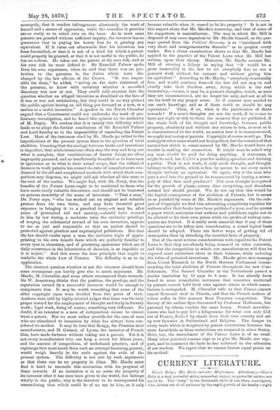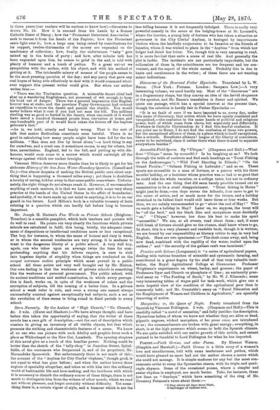CURRENT LITERATURE.
Ginr's Baby ; His Berth and other Misfortunes. (Strahan.)—Ginx's Baby is a very powerful satire, somewhat unjust, as powerful satires are apt to be. The " baby" is the thirteenth child of one Gins, a navigator, who, driven out of all patience by the rapid growth of his family—eight
in three years (our readers will be curious to know how)—threatens to drown No. 13. How it is rescued from his hands by a Roman Catholic Sister of Mercy ; how the "Protestant Detectoral Association" seek to rescue it from the hands of the Papists ; how the Protestant sects fight over it ; how, a large sum being raised by contributions for its support, twelve-thirteenths of the money are expended on the machinery of collection ; how, finally, the unfortunate " baby " gets mixed up in the broils of party ; and how, after infinite talk has been expended upon him, he comes to grief in the end, is told with plenty of humour and a touch of pathos. To a great extent we sympathize with the author, with his object, and with his method of getting at it. The intolerable misery of masses of the people seems to be the most pressing question of the day ; and any party that gave any real hopes of being able effectively to deal with it would command what- ever support this present writer could give. But when our author writes thus:— " There was the Timbuctoo question. A miserable desert chief had shut up a wandering Englishman, not possessed of wit enough to keep his head out of danger. There was a general impression that English honour was at stake, and the previous Fogey Government had ordered an expedition to cross the desert and punish the sheikh. You would never believe what it coat if you had not seen the bill. Ten millions sterling was as good as buried in the desert, when one-tenth of it would have saved a hundred thousand people from starvation at home, and one-hundredth part of it would have taken the fetters off the hapless prisoner's feet."
—he is, we hold, utterly and basely wrong. That is the sort of talk that makes Radicalism sometimes seem hateful. There is no good in calculating how many people might have been fed for the ten millions. "Man does not live by bread alone,"—a hard thing to say for ourselves, and a cruel one, it sometimes seems, to say for others, but true, nevertheless. England, fed to the fall, and putting up with dis- honour, would soon come to a sorrow which would outweigh all the wrongs against which our author inveighs.
Viscount Milton deserves more thanks than he is likely to get for his elaborate History of the San Juan Water-Boundary Question. (Cassell and Co.)—One almost despairs of making the British public care about any- thing that is happening a thousand miles away ; yet there is doubtless a faculty of caring, hidden away in that same public somewhere. Unfortu- nately, the right things do not always reach it. However, if we remember anything of such matters, it is that we have met with some very sharp practice at the hands of the United States in the affair of boundaries ; and probably, if we have made up our mind to anything, it is to be on our guard in the future. Lord Milton's book is a valuable treasury of facts relating to a question which can hardly fail before long to become important.
Mr. Joseph H. Hutton's Few Words on Private Schools (Brighton: Treacher) is a sensible pamphlet, which both teachers and parents will do well to read. He points out very clearly the functions which private schools are calculated to fulfil, this being, briefly, the adequate treat- ment of dispositions or intellectual conditions more or less exceptional. The boy, for instance, in whom the sense of honour and duty is weak, or in whom the sensual tendencies are very strong, it is madness to trust to the dangerous liberty of a public school. A very dull boy, again, one who takes upon an average twice the time for com- prehending anything that his fellows require, is sure to sink into hopeless depths of stupidity when things are conducted on the occupet artremum scabies principle which must prevail in a public school. All these points are very well brought out by Mr. Hutton. Our own feeling is that the weakness of private schools is something like the weakness of personal government. The public school, with its ancient traditions and settled constitution, in which every preroga- tive is fixed, works on, in spite of the weakness of rulers and the corruption of subjects, till the coming of a better time. In a private school a weak ruler is ruin, and even a strong one cannot always successfully contend against exceptionally bad subjects, each a set as the revolution of time seems to bring round in fixed periods to every school.































 Previous page
Previous page